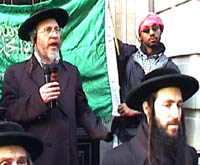
|
|
|
||||
|
There's
a difference between
December 9, Whitehall. The annual Al-Quds (Jerusalem) Day demonstration is coming to a rowdy climax. Unusually, it is highly charged this year, but it's another difference that catches the eye. From atop some steps a tremulous voice rises above the rallying crowd. The root cause of the Middle East conflict, it is saying, is Zionism. Without an end to this racist ideology and the dismantling of Israel, there will never be any peace. There are roars of approval. Somebody initiates a round of "Allahu-Akbar". The yellow and green flags of Hezbollah fly once again. But here's the rub. The man they're cheering is Rabbi Goldstein, an orthodox Jew of the Neturei Karta. As he speaks, a clutch of photographers vie to capture the same image: another rabbi, pig-tailed and in his bekisch, standing in front of an animated young Muslim, punching the air, his head draped in a kefiyeh. "Judaism yes, Zionism no," chants the crowd. It's iconoclasm in motion. Hezbollah and the Homburg, Muslim and Jews, standing shoulder to shoulder to demolish a great myth of our time: that anti-Zionism and anti-semitism are the same thing. Rabbis of the New York branch of the same order, numbering hundreds of thousands of Jews worldwide, also relayed their message to this summer's UN conference on racism in Durban, which, unlike Linda Grant, I observed first hand. Travelling there in a joint delegation with the Islamic Human Rights Commission, they took the event by storm. For decades Zionists have been slurring Jewish opponents of Zionism, such as Noam Chomsky and Norman Finkelstein, as self-hating Jews, and their gentile allies as anti-semites. Since the rabbis cannot be accused of either, they are the perfect myth-busters. Before Zionism reared its ugly head, Muslims and Jews enjoyed amicable relations. The prophet Mohammed kept a Jewish wife, Safiya. The great 12th-century Jewish physician-philosopher Maimonides was physician to Saladin. In 1492, when the Catholic monarchs Ferdinand and Isabella forced Jews to renounce their religion, they went to Morocco, where they flourished. Emerging in 19th-century Europe, out of nationalist sentiment and a reaction to anti-semitism, Zionism poisoned this congenial atmosphere. Indeed, until the colonial state materialised in 1948, and reprisal attacks for the expulsion and massacres of Palestinians drove them out, large, thriving Jewish communities were a feature of Arab and north African cities. Israel killed peaceful coexistence. And in order to immunise itself, and its founding myths, it soon found a convenient device in the stain of anti-semitism. For any potential critic, the fear of being charged with the crimes of the Nazis was the ultimate deterrent, an act of professional suicide. The mud is slung at anyone who dares attack the law of return, the de facto ban on Arabs acquiring land, the continued confiscation of their soil, Israel's refusal to let the 1948 and 1967 refugees return, and its politicians' claims to the site of the Al-Aqsa mosque. In Israel, the state's raison d'être is above questioning, and anyone violating that sacred cow faces jail. It is OK, though, for Zionist Israelis to call Arabs "cockroaches", deny their right to statehood, and demand their "transfer". Now Zionists want to include in the infinitely elastic definition of anti-semite those who oppose a two-state solution. This is almost too absurd to dignify. Will they label anti-white all those black people in South Africa who wanted the dismantling of apartheid? Anti-semitism and Islamaphobia are related hatreds. But a growing source for the latter is the Israel-first lobby among the Jewish community in this country. The far right's change of strategy to target "the Muslim problem" has barely excited a whimper from the Zionist Jewish Board of Deputies. Other Zionists, such as Melanie Phillips, have used September 11 as a platform to attack the loyalty of British Muslims. Memorably, Phillips came to grief on Question Time at the hands of Will Self, who reminded her that British Jews also serve in foreign armies. Thank God for the rabbis. Their new alliance with Muslims exposes the fallacy that Muslims who are anti-Israel are, ipso facto, anti-semitic. Grant didn't mention them at all in her piece. But then again, neither have most journalists for the past 50 years. · Faisal Bodi is a writer on Muslim affairs and editor of ummahnews.com
See our photo coverage of the Quds Day Rally http://www.inminds.co.uk/qudsday2001.html
Letters to The Guardian:
|
||||

